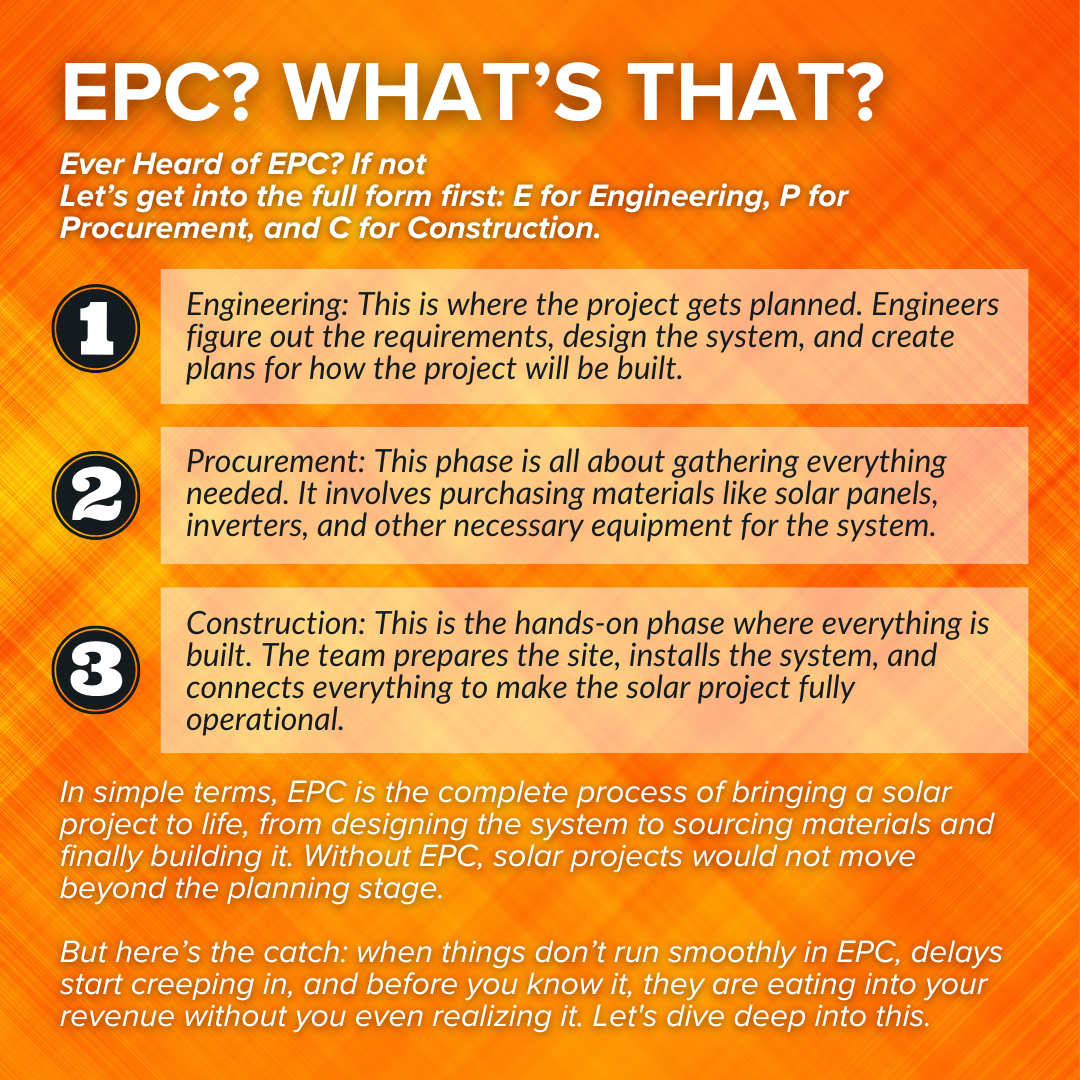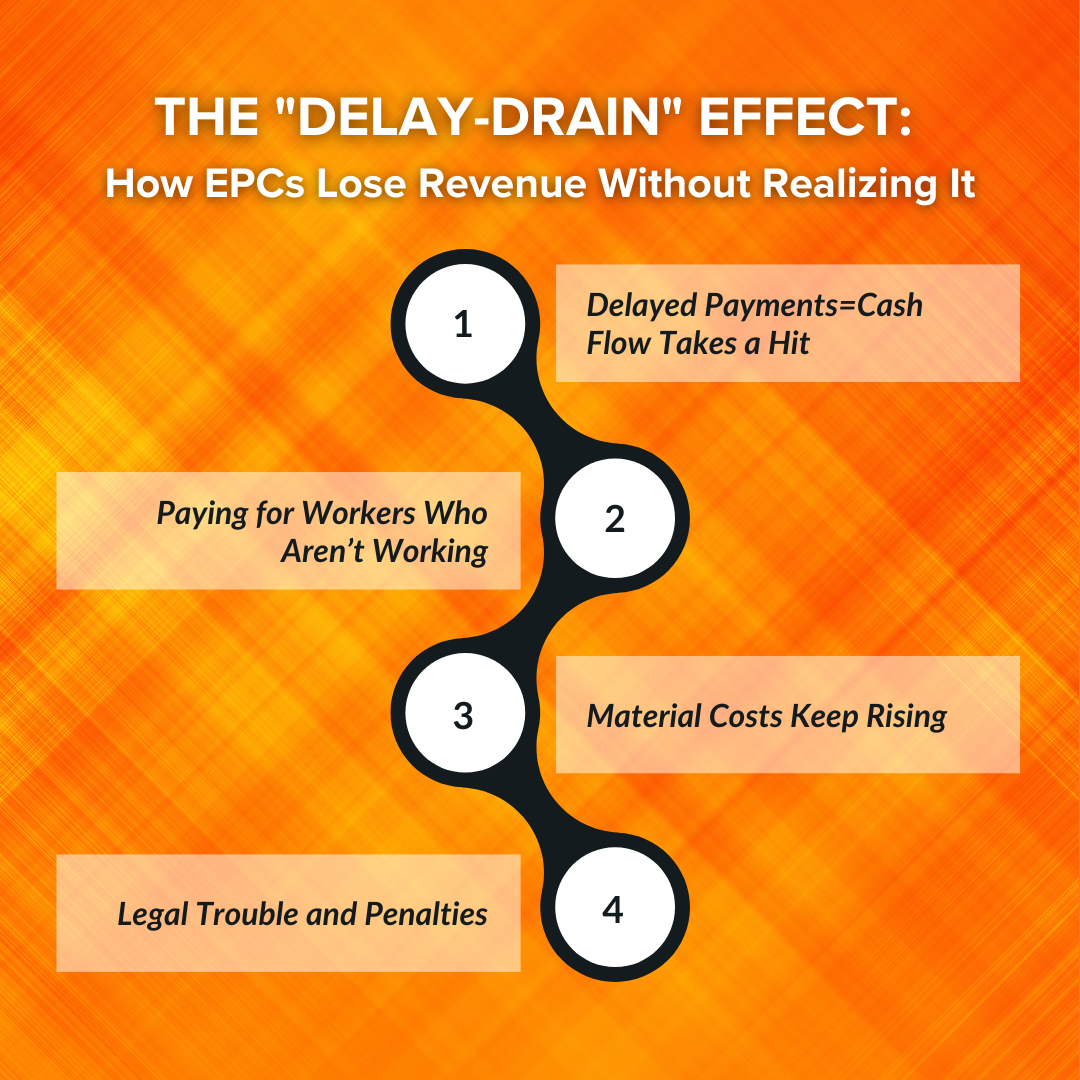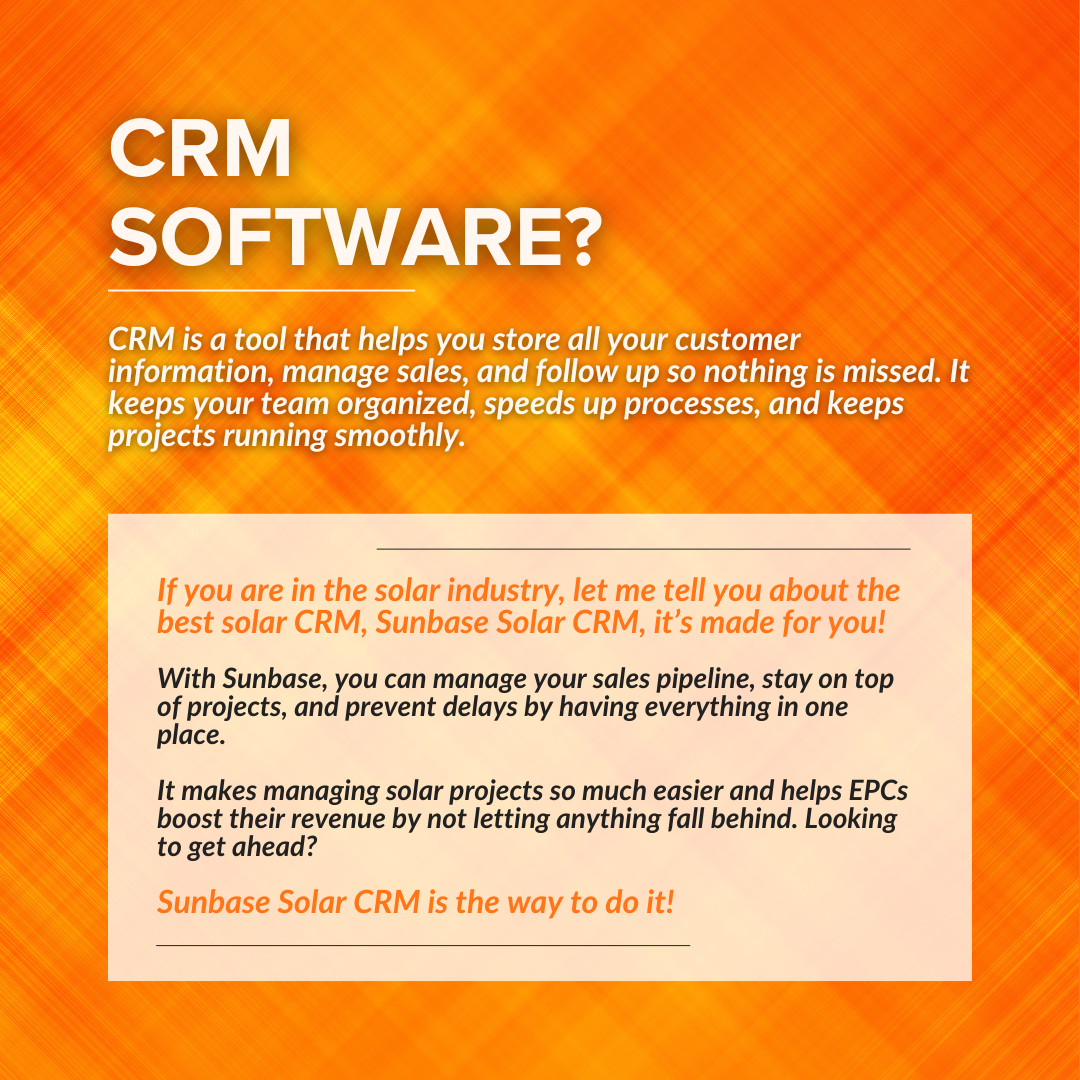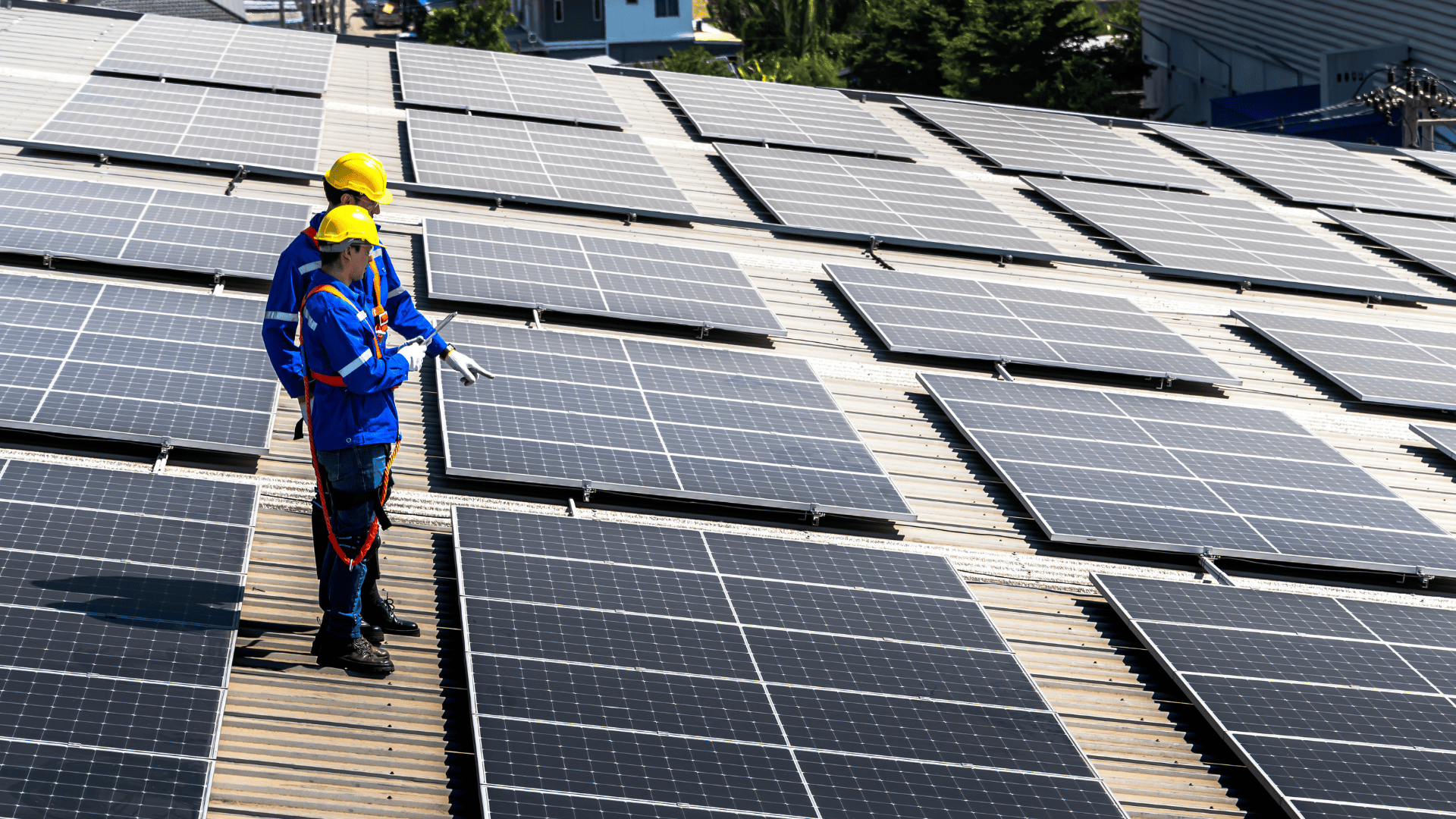February 25, 2025
Solar EPC is on a roll, with the market expected to soar from $234.91 billion in 2023 to $398.92 billion by 2032, but here’s the catch: delays are eating into profits faster than the industry can grow.
On average, solar construction projects experience delays of about 20%, which could mean $2 million in additional costs for a 50 MW photovoltaic project. Two million dollars just because things didn’t run on time.
Why does this happen? Stalled permits, missing inventory, scheduling headaches—these slowdowns add up, squeezing margins and delaying cash flow. But here’s the good news: these delays are preventable. Now the question is how?
That’s exactly what Solar CRM does. Automating workflows, tracking permits, optimizing schedules, and keeping everything (and everyone) in sync turns time-wasting delays into revenue-boosting efficiency.
The market is growing, and demand is high. The only question is: Is your EPC ready to scale without delays holding it back?
Read: 2025 Checklist for Solar EPC Firms: Key Software Features to Look For
Key Takeaways
- EPC is the backbone of solar projects, ensuring a seamless journey from design to installation.
- How EPCs Lose Revenue Without Realizing It: Delayed Payments=Cash Flow Takes a Hit, Paying for Workers Who Aren’t Working, Material Costs Keep Rising, and Legal Trouble and Penalties.
- Sunbase Solar CRM keeps EPCs organized by managing sales pipelines, tracking customer interactions, and ensuring nothing is missed, preventing delays and boosting revenue.
- How Solar CRM Helps Solar Companies Prevent Costly Delays And Boost Revenue: Automated Invoicing & Payment Tracking, Project Scheduling & Task Automation, Inventory Forecasting & Procurement Automation, Compliance & Contract Management.
EPC? What’s That?

Ever Heard of EPC? If not
Let’s get into the full form first: E for Engineering, P for Procurement, and C for Construction.
- Engineering: This is where the project gets planned. Engineers figure out the requirements, design the system, and create plans for how the project will be built.
- Procurement: This phase is all about gathering everything needed. It involves purchasing materials like solar panels, inverters, and other necessary equipment for the system.
- Construction: This is the hands-on phase where everything is built. The team prepares the site, installs the system, and connects everything to make the solar project fully operational.
In simple terms, EPC is the complete process of bringing a solar project to life, from designing the system to sourcing materials and finally building it. Without EPC, solar projects would not move beyond the planning stage.
But here’s the catch: when things don’t run smoothly in EPC, delays start creeping in, and before you know it, they are eating into your revenue without you even realizing it.
Let's dive deep into this.
The "Delay-Drain" Effect: How EPCs Lose Revenue Without Realizing It

Delays in Engineering, Procurement, and Construction (EPC) aren’t just minor setbacks; they quietly eat
away at your profits. Many companies don’t even realize how much revenue they lose until it’s too late.
Let’s break it down:
1. Delayed Payments=Cash Flow Takes a Hit
Delayed payments create a ripple effect that disrupts cash flow, making it harder for EPC firms to pay crews, buy materials, and keep projects on track. With payments taking longer to arrive, many firms are forced to stretch budgets, take on debt, or even pause work. The impact is massive:
- 94 days – the average wait time for payments, leaving firms struggling with operational costs.
- $273 billion – the added cost to construction bids in 2023, as contractors adjust pricing by 6% to 10% to compensate for slow payments. 57% of general contractors and 78% of subcontractors experienced work delays due to late payments. (Source)
- 141% increase in liens filed by subcontractors, signaling growing frustration over cash flow issues.
- 34% of general contractors lost contracts because developers couldn’t secure project financing, often due to payment delays. (Source)
These cash flow disruptions create a chain reaction that cuts into revenue, delays future work, and
threatens long-term profitability.
2. Paying for Workers Who Aren’t Working
When a project gets delayed, one of the sneaky costs is paying workers who are not even working.
If your crew is stuck waiting for things to move forward, you are still covering their wages, even though they are not on the job. And it's not just their pay; you also have to cover the extra costs of managing and supporting the team while they sit around. The longer the delay, the bigger the bill.
So, even though nothing’s getting built, you are still paying for the workforce to hang around, and those costs can add up quickly. It’s a financial hit that many don’t realize until it’s too late.
3. Material Costs Keep Rising
Delays don’t just push back schedules; they also make materials more expensive.
Prices change constantly, and over the past five years, construction costs have jumped a lot due to supply shortages. Waiting too long to complete a project can mean paying a lot more than planned.
4. Legal Trouble and Penalties
Delays don’t just cost time; they can also lead to serious legal trouble.
About 68% of construction law disputes are linked to delays, making them a major cause of conflict in the industry. (Source)
When delays cause disputes, they often end up in arbitration or litigation, which can rack up legal fees.
On top of that, delays can lead to penalties, fines, and the need for settlements, all of which can quickly add up, making the situation even more expensive.
CRM Software?

Do you know what CRM is? It’s Customer Relationship Management Software, and trust me, it can help
EPCs avoid delays and lost revenue. CRM is a tool that helps you store all your customer information, manage sales, and follow up so nothing is missed. It keeps your team organized, speeds up processes, and keeps projects running smoothly.
If you are in the solar industry, let me tell you about the best solar CRM: Sunbase Solar CRM. It is made for you! With Sunbase, you can manage your sales pipeline, stay on top of projects, and prevent delays by having everything in one place.
It makes managing solar projects much easier and helps EPCs boost their revenue by preventing project delays. Looking to get ahead? Sunbase Solar CRM is the way to do it!
Check out: 10 Ways a Solar CRM Can Revolutionize Your Business Workflow
How Solar CRM Helps Solar Companies Prevent Costly Delays And Boost Revenue

Project delays can turn a profitable solar business into a financial struggle. However, with the right solar CRM, these delays can be prevented before they start. Here’s how:
1. Automated Invoicing & Payment Tracking - Faster Payments, Better Cash Flow
How CRM Solves It:
- Automated invoicing ensures that invoices are sent on time, reducing payment delays.
- Payment tracking provides real-time visibility into pending payments, allowing teams to follow up before they become a cash flow problem.
- Automated reminders notify clients about due payments, minimizing overdue accounts.
Impact: Faster payments mean steady cash flow, helping solar sales teams and project management teams keep operations running smoothly.
How This Boosts Revenue:
- Faster payments mean better cash flow and no waiting around to reinvest in new projects.
- Reduced revenue leakage—every invoice is tracked, so nothing gets lost.
- More financial stability and steady payments keep everything running smoothly.
2. Project Scheduling & Task Automation - No More Paying for Idle Workers
How CRM Solves It:
- Automated scheduling keeps installation and service teams aligned with project timelines.
- Task automation eliminates manual coordination, ensuring every step in the sales process and installation is optimized.
- Real-time project tracking prevents bottlenecks and allows quick adjustments.
- Task assignment: Automatically assigns tasks to workers, making sure everyone has a clear responsibility
Impact: Labor costs are optimized, and no one is getting paid to sit around waiting.
How This Boosts Revenue:
- More projects per month = more revenue flowing in.
- No paying workers to sit around; every hour is productive.
- Faster project completion = quicker final payments.
3. Inventory Forecasting & Procurement Automation - No More Material Cost Overruns
How CRM Solves It:
- Inventory forecasting helps predict material needs, preventing last-minute purchases at inflated prices.
- Procurement automation streamlines orders, ensuring materials arrive on time.
- Supplier tracking keeps project management teams informed of availability and delays.
Impact: Solar business operations remain on budget, avoiding unexpected material shortages and delays.
How This Boosts Revenue:
- Lower material costs: Buying smarter means better margins.
- No revenue lost due to supply delays: Materials are ready when needed.
- Bigger savings on bulk purchases: Better planning means better deals.
4. Compliance & Contract Management - Avoid Legal Trouble & Penalties
How CRM Solves It:
- Automated permit tracking ensures deadlines aren’t missed.
- Contract management keeps all legal documents organized and accessible.
- Compliance reminders help solar companies stay ahead of regulatory requirements.
Impact: Legal risks are minimized, preventing costly disputes, fines, and project shutdowns.
How This Boosts Revenue:
- No penalties eating into profits: Staying compliant means keeping money where it belongs.
- Winning bigger projects: Well-managed paperwork makes your company more trustworthy.
- Avoiding expensive rework: Getting things right the first time saves cash.
A solar CRM integrates lead management, project scheduling, invoicing, inventory tracking, compliance management, and customer communication. It eliminates costly delays, increases efficiency, and maximizes revenue for solar companies, solar sales teams, and project management professionals.
Go Through: Top 10 Ways CRM Software Can Transform Your Solar Business
Conclusion
Delays don’t just slow things down; they drain revenue, frustrate teams, and give competitors the edge.
A stalled permit here, a late invoice there, and suddenly, projects that should be moving full speed ahead are stuck in limbo. But what if those delays weren’t an issue?
With the right Solar Software CRM, EPCs can keep projects on track without constant firefighting.
Automated invoices speed up cash flow, and smart scheduling keeps crews working instead of waiting.
Inventory forecasting ensures materials are always ready. Compliance tracking? There is no more panicked rushing. Every part of the process flows smoothly, turning what used to be roadblocks into
momentum.
The solar industry moves too fast to let delays hold you back. So the question isn’t will your EPC grow, it’s whether it will grow smoothly or get stuck in delay after delay.
The choice is yours. Want fewer setbacks and more revenue? Sunbase is ready when you are. Let’s build faster, smarter, and without the wait.
About Sunbase
Tired of delays eating into your revenue?
Sunbase Solar CRM keeps your projects on track, your sales pipeline moving, and your team organized, all in one place. Less waiting, more building. Ready to speed things up? Let’s go!
Frequently Asked Questions
Q1. Why do some EPCs struggle to close deals even with a strong sales team?
Because managing a sales pipeline manually is messy, leads slip away, follow-ups get delayed, and deals stall. A CRM solution with sales automation ensures every opportunity is tracked and moved forward without extra effort.
Q2. How does Solar CRM software improve cash flow for EPCs?
Delayed invoicing and slow payments hurt cash flow. A solar CRM solution automates invoicing, tracks payment statuses, and sends reminders so EPCs get paid faster and keep projects moving without financial roadblocks.
Q3. How does a Solar CRM improve decision-making for EPCs in complex sales cycles?
A Solar CRM provides real-time data on leads, customer interactions, and project progress, allowing EPCs to make informed decisions. Analyzing sales trends, tracking sales reps' performance, and forecasting revenue helps optimize strategies, allocate resources effectively, and minimize project delays.
I agree to receive marketing messaging from Sunbase at the phone number provided above. I understand data rates will apply, and can reply STOP to OPT OUT.







